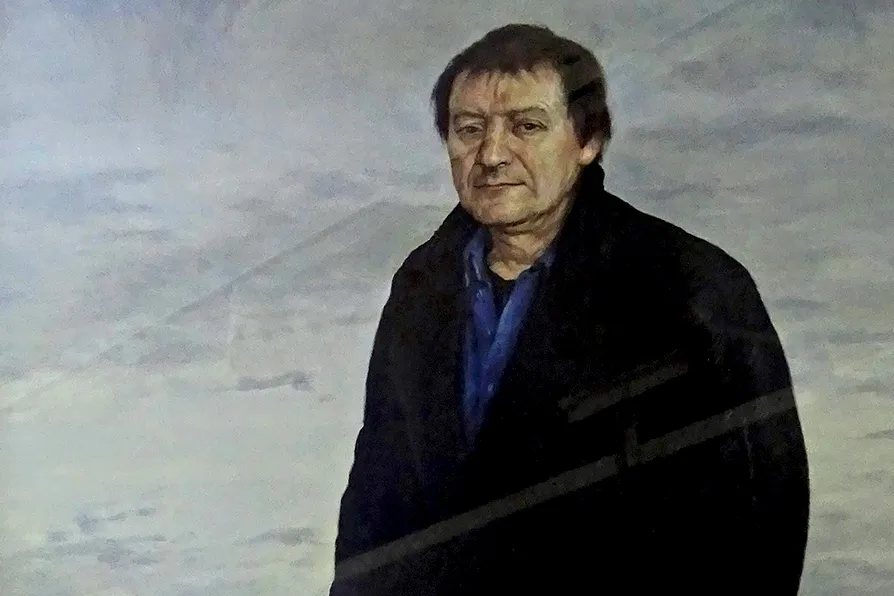RON JACOBS welcomes a timely history of the Anti Imperialist league of America, and the role that culture played in their politics
JOHN NEWSHAM recommends rereading Tony Harrison’s poem V for its relevance to 2025

 Tony Harrison by Christopher Stevens, 1993, Saltmills bookshop [Pic: duncanh1/Flickr}
Tony Harrison by Christopher Stevens, 1993, Saltmills bookshop [Pic: duncanh1/Flickr}
“NEXT millennium you’ll have to search quite hard/ to find my slab behind the family dead.”
With these words, poet Tony Harrison, who died last week aged 88, opened his unflinching, state-of-the-nation poem: V. Written in 1985, and airing on Channel 4 two years later, the poem is one rooted in its age: in the disaffection of the Thatcher era, the miners’ strike, and the rise in support for the National Front.
Watching the televised reading four decades on, in the wake of Harrison’s death, some of the content is notably dated. The graphics belong to a bygone age, as do several of the political references. Yet the conflicts at the centre of the poem are every bit as relevant today. The names of the clashing parties may have changed, but Britain is no less a place of civil hostility and internal turmoil.
V is a poem which deals in conflict. It is a poem which does not console any “side” with the comfort of moral validation. Even its title nods in many directions: to the V sign, variously connoting peace, victory, or insult. And, mostly, from division, from the abbreviation of “versus” in the listing of football matches (a pun, also, on the aggravating potential of Harrison’s own “verses”). From those small, weekly oppositions — from “Leeds v Derby” — the poem moves to consider the wider conflicts that defined the country. “Black/White man v woman; left v right,” the speaker laments, “these Vs are all the versuses of life.”
V follows Harrison’s discovery of graffiti sprayed on his parents’ gravestone in a Leeds cemetery. While many of the other stones are daubed with racist epithets or “crude, four-letter words”, Harrison’s parents’ names are obscured by a sprayed “UNITED,” left, he presumes, by a Leeds fan. Anyone wishing to understand Britain, even 40 years on, would do as well to start here, in Holbeck Cemetery, as with Blake, Orwell or the Brontes:
“The prospects for the present aren’t too grand/ when a swastika with NF (National Front)’s / sprayed on a grave, to which another hand / has added, in a reddish colour, CUNTS./ Which is, I grant, the word that springs to mind, / when going to clear the weeds and rubbish thrown…”
Many of the racist slurs sprayed on the graves are recounted directly: something which contemporary writers may avoid. But Harrison examines the roots of racist sentiment with an unusual degree of empathy and nuance. He reflects on both the NF-supporting vandals and his own late father’s bewilderment at the changing culture of his city. The poem is built of a genuine desire to understand why so many are drawn to the far right, to “aggro,” or the vandalism of graves.
Unlike much of the bluntest political writing, Harrison never vaunts one viewpoint as morally superior. But his attempts to humanise those with whom he disagrees go further than most. As the poem progresses, the speaker imagines a confrontation between himself and the young man who sprayed his parents’ grave. In both the poem’s written form and Harrison’s performance, the speaker affects contrasting voices: one, the standardised voice of the poet; the other, regionalised, of the angry, young vandal:
“If mi mam’s up there, don’t want to meet ’er/ listening to me list mi dirty deeds, / and ’ave to pipe up to St fucking Peter/ ah’ve been on t’dole all mi life in fucking Leeds.”
As the confrontation escalates, the voices of the two begin to merge, until the poem’s reveal: “He took the can, contemptuous, unhurried/ and cleared the nozzle and prepared to sign / the UNITED sprayed where mam and dad were buried./ He aerosolled his name. And it was mine.”
Reading V in 2025, it is clear that most of the “versuses of life” go unresolved. The left and right exchange even more vitriol, amplified by online polarisation. Racist aggravation, a confident far right, and class conflict are all, again, dominant themes in British politics, perhaps even more so than in 1985.
But in Harrison’s poem we find something lacking in much contemporary dialogue: a willingness to take responsibility for conflicting sides; to internalise and humanise the antagonism; to relate and empathise. This does not just stem from the speaker’s identification with the vandal, but through his reflection of the humanity common to all these vast, abstract conflicts:
“Hindu/Sikh, soul/body, heart v. mind,/ East/West, male/female, and the ground / these Fixtures are fought out on’s Man, resigned.”
This is not a poem for easy answers. It resolves almost none of “the versuses of life.” Yet there are moments of redemption, even as their overreach goes acknowledged by the speaker:
“Though I don’t believe in afterlife at all / and know it’s cheating, it’s hard not to make/ a sort of furtive prayer from this skin’s scrawl,/ his UNITED mean ‘in Heaven’ for their sake/ an accident of meaning to redeem/ an act intended as mere desecration/ and make the thoughtless spraying of his team/ apply to higher things, and to the nation.”
Ultimately, this poem asks the reader to leave its most difficult questions unanswered. But those questions: of who we are, as a nation, of how we account for our divisions and the worst of our collective selves, are every bit as relevant today.
A reading of V will take place at Holbeck Cemetary this Sunday, October 12. For information and tickets see: https://www.ticketsource.co.uk/whats-on/leeds/holbeck-cemetery/v-a-homecoming-2-30pm/2025-10-12/14:30/t-glxxkem










